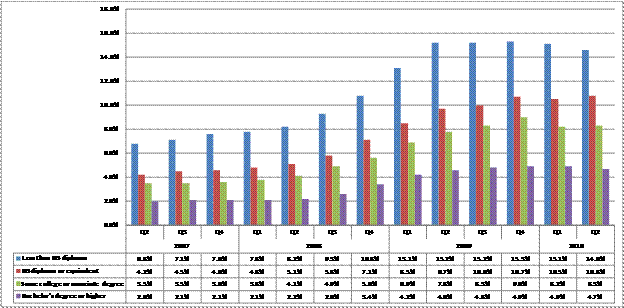|
Workforce Development
Unemployment is high. Why can’t I find skilled workers?
By Leslie Parady, Project Manager
In the past three years there has been a massive influx of people entering the job market. An online ad generates hundreds, if not thousands, of responses. So why are companies finding it so hard to find skilled people?
For one thing, the unemployment rate may not be what you think it is. Depending on the educational level that you require, the unemployment rate may be below 5% or up around 15%. In addition to a large number of job seekers, there are qualified individuals who have opted not to change positions or leave their current company due to the economic climate, further reducing the number of skilled applicants.
Employment Status, 25 years old and over, by educational attainment
Source: www.bls.gov
It may actually be harder to recruit during poor economic conditions. The sheer volume of “mismatched” talent makes it more difficult to review potential candidates. As the economy sheds more jobs in the lower skilled areas, more average and below average candidates apply for positions. The percentage of qualified applicants goes down.
The aging workforce has also impacted the talent pool. Baby boomers may have delayed their retirement as their 401ks lost value but they are leaving. As they depart, so too does their knowledge and skills. In their place will be replacement workers who do not yet possess the level of skill as the aging workers, immigrants who may have language issues, people from industries that have seen a sharp decline in employment. There will be more competition in the market for the perfect fit candidates.
Manpower reports in 2009 Talent Shortage Survey that the top five positions to fill have remained unchanged: skilled manual trades people, sales representatives, technicians (technical workers in the areas of production/operations, engineering and maintenance), engineers and management/executives.
There are many industries where the jobs are likely gone for good—construction, automotive, real estate, retail. Educated, highly skilled people who don’t have the exact skills that your company requires. But they do have skills, many of which are transferrable to your organization if you know what your critical skills needs are. Narrow definitions of the appropriate skills sets make recruiting more difficult as fewer candidates are the perfect fit.
Not long ago MassMEP trained a gentleman who was just universally liked. We liked him, his classmates liked him, his instructors liked him, the employers liked him. He was confident but not cocky, self assured. He gave you the impression that he could handle whatever was thrown at him. AND HE HAD ABSOLUTELY NO MANFACTURING EXPERIENCE BEYOND OUR CLASS.
Yet every employer was interested in him and several made offers. Did he fill a need or a want? Probably a little bit of both. One company saw his long term potential and supervisory background as an investment in their future. Another one needed a skilled operator to make parts immediately. He would need significant OJT at either company but one saw transferrable skills while the other simply liked him. There were several trainees in the same class with a machine operator background who could’ve been running parts in a much shorter amount of time.
It is time to be realistic and take stock of what is available in the talent pool. Do you have a talent roadmap and know what skills each open position requires? Have you analyzed the core competencies that a candidate MUST have to be successful in your organization? Can you put “needs” above “wants”? For those employers who currently have openings and are lamenting that there were few, if any, candidates with the “right” skills set, focus on other jobs and industries that have relevant skills sets and will provide a good foundation upon which to build. We are talking about changing the way we recruit and screen potential candidates. Instead of looking on the ground for the loose gems we now have to take part in creating our own.
If you are interested in developing your talent roadmap, please contact Leslie Parady, MassMEP Project Manager at 508-831-7020 or [email protected].
Have an Opinion?
Have an opinion to share? Send a Letter to the Editor.
|
